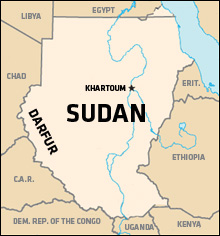 Unlike the war in Iraq (too many doubts about troop withdrawal), or the BU-biolab controversy (too local), or immigrant rights (too intangible, at least for many in the Northeast), the fight to end genocide in Darfur — in which more than 300,000 have died, and 3.5 million are suffering violence and starvation — has brought out a cohesive movement of student activists.
Unlike the war in Iraq (too many doubts about troop withdrawal), or the BU-biolab controversy (too local), or immigrant rights (too intangible, at least for many in the Northeast), the fight to end genocide in Darfur — in which more than 300,000 have died, and 3.5 million are suffering violence and starvation — has brought out a cohesive movement of student activists.
Weldon Kennedy, a 22-year-old Brandeis University senior who will graduate this May, thinks he knows why Darfur resonates with so many young people.
“Genocide is not a crime like a murder, or a theft, or a rape — it’s all of those things,” says Kennedy, who serves on the executive board of Students Taking Action Now: Darfur (STAND) and until this month was president of his college chapter. “It embodies so much more than the sheer number of deaths. It embodies hate.”
Since its inception at Georgetown University in 2004, 200 STAND chapters have sprung up nationwide; six are in the Boston area, and one of the largest is at Brandeis, where one-quarter of the student population (about 700 people) subscribes to the group’s e-mail list, and more than 100 students regularly participate in group events.
Once a person learns about the situation in Darfur, he or she “can’t put it down,” Kennedy says. He should know: his involvement began just last year. “How can you go to class — how could I go about my schedule, knowing this is going on in the world?” he says by way of explanation.
ADVERTISEMENT
 |
The Save Darfur movement has gained significant momentum in recent months, both locally and nationwide. Last year, Harvard students convinced university officials to divest from PetroChina, an oil company with deep ties to the Sudanese government perpetrating the genocide. The Save Darfur Coalition (of which STAND is a part) recently launched a Million Voices for Darfur postcard campaign, which is sending postcards to President George Bush urging greater involvement in Darfur. Last July, the coalition’s Massachusetts chapter held a rally, attended by 500, at City Hall Plaza. Media coverage continues to grow. Congress — which in 2004 officially labeled the atrocities in Darfur “genocide” — is considering several bipartisan bills that address the crisis by allocating more money to humanitarian relief and supporting the efforts of African Union forces to quell the slaughter, as well as urging a role for NATO and cooperation with the International Criminal Court. Advocates claim that both the Bush administration and the United Nations are too slow to take measurable action.
That’s why hundreds will converge on Washington, DC, this weekend. On Thursday and Friday, students will lobby their senators and representatives on Capitol Hill, and on Saturday they will participate in student-activism training.
Sunday they will regroup for a rally in front of the Capitol, in a united front. They’re hoping for large numbers, but they don’t expect the usual show of opposition mounted at activist events. After all, as Kennedy points out, genocide is one issue “where the other side doesn’t really exist.”
To learn more about the situation in Darfur, local STAND chapters, and the rally, visit savedarfur.org, standnow.org, and millionvoicesfordarfur.org.